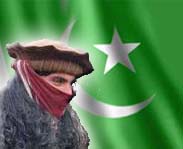Pressure forces Taliban chief into talks with Pakistan
 Peshawar - Taliban chief Baitullah Mehsud, whose grim rule in Pakistan's tribal district of South Waziristan is marked by suicide bombings and throat-slitting, has contacted the government through mediators for peace talks, official and tribal sources say.
Peshawar - Taliban chief Baitullah Mehsud, whose grim rule in Pakistan's tribal district of South Waziristan is marked by suicide bombings and throat-slitting, has contacted the government through mediators for peace talks, official and tribal sources say.
The pleading might have come partly from a near perfect stranglehold the security forces have on him and partly because his fellow Taliban leaders are advising him to be on good terms with the Pakistani government and avoid spoiling their game plan in Afghanistan.
"We have been trying to convince both sides (Mehsud and the government) that fighting will only bring death and destruction to South Waziristan so they should talk," said a tribal elder, who is also from the Mehsud tribe and a member of a religious political party.
"Now the ice has started to melt," the tribal elder said on condition of anonymity. "We have conveyed Mehsud's message to the government and the government's conditions to him."
If the negotiations, which are still indirect and at the initial stage, succeed, then Mehsud would be required to end attacks on civil, military and foreign targets inside Pakistan.
In return the Pakistan Army would temporarily shelve its plans to push inside the tribal district to fight Mehsud's militia of thousands of well-trained and well-equipped fighters, entrenched across the rugged terrain spanning more than 2,550 square kilometers.
Pakistan has struck several peace deals with Mehsud, the last one in 2007 after a botched offensive, but each such understanding made him stronger.
Army spokesman Major General Athar Abbas rules out a dialogue with Mehsud but a senior government official privy to the development said the government had "told those who are negotiating with Baitullah what it wants."
"If he accepts our demands, well, it's good, otherwise we have other options," said the official, who requested anonymity.
The official claimed the main reason for Mehsud's plea for talks was the squeeze security forces have put on him.
Military and paramilitary troops have blocked four main roads and dozens of muddy tracks running through small villages to cut off his supply lines from the rest of the country.
His previous capability to strike anywhere in Pakistan has been reduced by the arrests of hundreds of his supporters in the Tank, Dera Ismail Khan, Bannu and Lakki Marwat districts of North Western Frontier Province, which borders South Waziristan.
"They were the main linkages between the Taliban in South Waziristan and many other smaller terrorist groups across Pakistan who facilitated suicide bombers in carrying out attacks," said a local intelligence official.
"With these linkages gone, Mehsud is a man who has a bullet (suicide bomber) but no gun to fire it," he said, adding that the actions in these districts led to the arrest of dozens of would-be suicide bombers who were already present in or were on their way to the major cities, including the capital Islamabad.
This has taken some of the sting out of Mehsud. While the suicide bombers killed an average of 90 people per month in the first six months of 2009, there has been no major suicide attack for the last two weeks.
But Pakistan has its reasons to allow mediators to engage with the tribal warlord, who has a 5-million-dollar price on his head as a key al-Qaeda facilitator and a bounty of 615,000 dollars in Pakistan for ordering a series of deadly bombings.
Its forces are overstretched because of the offensive against Islamist militants in Swat valley and three neighbouring districts.
Though the 12-week Swat operation is being wrapped up after regaining control of major cities, troops are planning to stay in the region in the coming months and perhaps years to rehabilitate nearly two million uprooted people and stop the Taliban from descending from the mountains and reorganizing.
The plan to "soften up" Mehsud with regular air and artillery strikes before a fully fledged ground assault has not worked very well. After initial strikes, the Taliban adopted better camouflage tactics and remain on the move.
"Sometimes after day-long bombardment we manage to kill even less than half a dozen insurgents," said a senior military commander who oversees the actions in South Waziristan from Dera Ismail Khan.
A publicly acknowledged peace deal or a secret understanding with Mehsud is going to raise eyebrows in Washington, which wants Pakistan to simultaneously press the Taliban on its side of the border as its forces fight them in Afghanistan.
But local analysts say that despite US concerns Pakistan would mainly focus on Swat and nearby areas where hundreds of schools and businesses destroyed by fighting still remain to be rebuilt. For that matter, keeping Mehsud silent in Pakistan for the moment would be helpful.
"We have our plate full, so don't expect that we would be taking on everything. It is not our responsibility, and we should first ensure our own security," said Talat Masood, a retired general and leading defence analyst. (dpa)